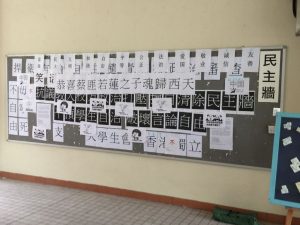By Chris Yeung –
Much has been said that university is a microcosm of a society. Hong Kong is no exception. A chain of clashes erupted in the city’s university campuses recently over Hong Kong independence, the death of the son of a deputy education minister and late mainland dissident Liu Xiaobo and his wife Liu Xia say volume of the state of the society. They have, again, laid bare a host of complex and deep-rooted contradictions among the seven-million populace.
The latest unrest in universities was unfolded with the appearance of banners that carried with four Chinese words, 香港獨立, which mean Hong Kong independence, at the Chinese University of Hong Kong when the new academic year commenced ten days ago.
It reignited a debate about whether such acts as putting on a banner or poster with the “four-word” slogan are unlawful. And even putting that aside, whether an expression of the four words should fall within the ambit of freedom of expression allowed under the Basic Law.
The debate was put on the society’s public spotlight when former chief executive Leung Chun-ying singled out a student union publication of the University of Hong Kong, Undergrad, for attack in his 2015 Policy Address. He called on public vigilance against the growth of advocacy for Hong Kong independence, citing an edition of the publication that featured independence.
Leung’s warning was followed by a blitz of intensified jibes by the central and Hong Kong government and their supporters against separatist thinking.
Top mainland officials have hinted at a resumption of the enactment of an anti-subversion law, known as Basic Law Article 23. During his visit to Hong Kong in July, President Xi Jinping has set out the “bottom-lines” for Hong Kong under the “one country, two systems” framework. In short, they can be boiled down to a No to Hong Kong independence.
Apart from verbal warning against separatist thinking, the Government has stepped up acts against advocacy for pro-independence, in both deeds and words. One major initiative was to kick out pan-democrat legislators who deviated from the oath-taking ordinance when they were sworn in. A total of six pan-democrat lawmakers were disqualified after the Government challenged the validity of their oaths.
Pro-independence groups were given warnings that their activities might breach the law. Schools were cautioned by the education authorities not to hold discussion on independence in classrooms.
It is against the background of a hard-hit approach by the mainland and Hong Kong governments to stifle public discussion on the issue of Hong Kong independence that those posters had been put on, presumably by students.
Act of defiance
It is unclear whether those who posted the pro-independence are seriously contemplating the idea of seeking Hong Kong independence. It is obvious that their acts could also been seen as a show of defiance against the authorities’ move to muzzle any talk about independence.
To students, their universities campuses could perhaps be the last corner in the city where they can discuss anything freely without any restrictions.
The row between students and the management of universities over the room for free debate in campuses when it comes to the issue of independence is a prelude to sharper conflicts in the months to come.
The storm whipped up at the Education University of Hong Kong by a poster that congratulated deputy education minister Christine Choi on the death of her son represents an outburst of anger towards the authorities in some quarters of the society.

A poster ridiculing deputy education minister over the death of her son put on at the Education University has caused a storm.
Although those insulting remarks have been widely criticised as inappropriate, the high-profile concerted efforts by Chief Executive Carrie Lam Cheng Yuet-ngor, education officials and university heads to condemn the act have been seen as excessive and politically-motivated.
The Government, some argued, should also be blamed for being “callous and insulting” in their deeds and words over a range of political and policy issues.
The right and wrong of the act of two unidentified people who put up the poster to ridicule Ms Choi over the death of her son at the Education University have become muddled at a time when the society is still sharply divided.
The return of the issue of Hong Kong independence to public limelight has flared up fresh conflicts between mainlanders and Hongkongers. A stand-off between a mainland student and Hong Kong students at the Chinese University over a pro-independence poster put on the “Democracy Wall” has run viral on social media.
Universities have emerged as the battlefields of highly-sensitive political ideas and sharply-conflicting values. They have never been a quiet and peaceful days. But like our society, they will be getting more noisy and chaotic.
Chris Yeung, Chief Writer of newly-launched CitizenNews, is founder and editor of the Voice of Hong Kong website. He is a veteran journalist formerly worked with the South China Morning Post and the Hong Kong Economic Journal. He writes on Greater China issues.
Photo: CitizenNews pictures
This article also appears on CitizenNews website.


Be the first to comment on "Universities now battlefields of politics, not ideas"